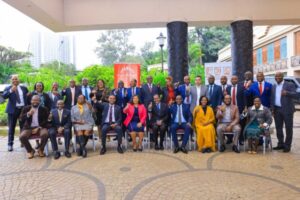The new tax reliefs announced by President Uhuru Kenyatta on Income Tax and Value Added Tax will remain in place till August 2020 as the state continues to asses the economic effect the COVID-19 pandemic will have on the economy.
In the draft Tax Laws Amendment Bill 2020 published by the National Treasury Thursday , companies contracting hospitals, petroleum and gas storage facilities, hotels and manufacturing premises will be allowed to claim up to 50% of their investment as tax allowances for the first year of operations.
COVID -19 pandemic pushes Kenya’s debt by 158 billion
The bill clearly spells out a variety of tax relief measures with positive influence on businessmen and corporations. constructors of commercial buildings and schools including student hostels will also be able to claim up to 10% of their investment annually on reducing balance.
The bill will be in the floor of the Parliament in the coming days and is expected to be passed in order to reduce the weight of economic constraints on individuals and businesses in Kenya due to the pandemic.
The draft Tax Laws Amendment Bill 2020 will also see businessmen and businesses pay new taxes on other revenue generating streams previously exempted as the National Treasury struggles to strike a balance between tax reliefs and safeguarding revenue collections.
According the bill, legal fees accrued by companies seeking to list shares or securities at the Nairobi Securities Exchange will also attract income tax.
This also extends to club subscriptions fees paid by employers on behalf of staff that were previously exempted from income tax.
And unlike in the past when businesses could deduct bad debts from their income together with other expenditures, the proposed amendments bill has deleted this provision.
This is to mean that businesses and banks will not claim income tax relief on account of non-performing loans.This announcement comes as many businesses report reduced operations and sales.
Banks are now negotiating new payment plans and credit restructuring for those adversely affected by the COVID-19 pandemic.

“The goal cannot be to stimulate demand and increase economic activity before the virus is under control. Instead, redistributive actions to smooth the shock are needed,” World Bank’s chief economist Stéphane Hallegatte and advisor Stephen Hammer stated in a joint statement.
The bill also wants foreigners operating sales promotion, marketing, advertising services, and transportation of goods in Kenya to pay income tax at applicable rates as it also makes it compulsory to for everyone transacting any business to keep a record of each transaction for at least five years.
Previously this provision was only applicable to registered businesses.



















